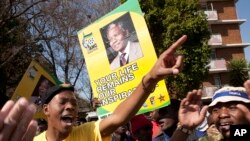South Africa’s State Broadcasting Corporation (SABC) is being accused by the opposition Economic Freedom Fighters (EFF) of employing Apartheid-era media tactics after the state broadcaster rejected the party’s political advertisement as part of its campaign in the run up to the May 7 general election.
Julius Malema, leader of the EFF, who was a former youth leader of the governing African National Congress (ANC) said the rejection of his party’s political advertisement, will undermine the credibility of the upcoming vote. The EFF will be contesting in this year’s election for the first time.
But, Kaiser Kganyyago spokesperson of SABC told VOA that the state broadcaster rejected the advertisement because it incited violence, which he says contravenes the code of conduct that governs the election campaigns and signed by all political parties. He dismissed accusations that the rejection of the opposition party’s campaign message was politically motivated.
Kganyyago says the advert called on South Africans to “destroy e-tolls physically”. Some experts describe the e-toll, a recently introduced new road tolling system, as controversial.
“We said that this is against the Icasa [Independent Communications Authority of South Africa] regulations, which prohibits any advertising that incites people to violence or any criminal activity. And that is why we said in the mailing [to them] that we are not able to do that advert,” said Kganyyago.
But, supporters of the EFF say SABC has infringed on their right to freedom of speech enshrined in the constitution. Malema also says his party’s message is being censored now, just like the days of the apartheid-era government media censorship.
South Africa media quoted Malema as saying, “Once you suppress the people contesting elections, it means you [are] not ready to give us free and fair elections, because unfair coverage leads to unfair elections,” said Malema.
Kganyyago disagreed saying the SABC is implementing an agreement signed by all the parties. He says the state broadcaster didn’t take an arbitrary decision to reject the EFF’s campaign message.
“Those people are very wrong because the regulations are not SABC regulations that are governing political advertising and these are the regulations that have been agreed to by all the parties,” said Kganyyago. “The Electoral Act indicates that that kind of behavior is not acceptable. That is why you will never find advertisement in the political sphere that says go and attack that party’s people because we don’t like them,” he said.
The EFF supporters say the party has petitioned Icasa to challenge SABC’s decision to reject its campaign message.
Kganyyago says the state broadcaster will air the opposition party’s advertisement if it removes the incitement of violence part of the message.
“The only obvious thing if they are not happy is to then approach Icasa because Icasa is the custodian of those regulations and they will be the final arbitrator in this matter and decide what the issues will be. It is a good idea that they went to Icasa because that is the only place they should go to,” said Kganyyago.
Julius Malema, leader of the EFF, who was a former youth leader of the governing African National Congress (ANC) said the rejection of his party’s political advertisement, will undermine the credibility of the upcoming vote. The EFF will be contesting in this year’s election for the first time.
But, Kaiser Kganyyago spokesperson of SABC told VOA that the state broadcaster rejected the advertisement because it incited violence, which he says contravenes the code of conduct that governs the election campaigns and signed by all political parties. He dismissed accusations that the rejection of the opposition party’s campaign message was politically motivated.
Kganyyago says the advert called on South Africans to “destroy e-tolls physically”. Some experts describe the e-toll, a recently introduced new road tolling system, as controversial.
“We said that this is against the Icasa [Independent Communications Authority of South Africa] regulations, which prohibits any advertising that incites people to violence or any criminal activity. And that is why we said in the mailing [to them] that we are not able to do that advert,” said Kganyyago.
But, supporters of the EFF say SABC has infringed on their right to freedom of speech enshrined in the constitution. Malema also says his party’s message is being censored now, just like the days of the apartheid-era government media censorship.
South Africa media quoted Malema as saying, “Once you suppress the people contesting elections, it means you [are] not ready to give us free and fair elections, because unfair coverage leads to unfair elections,” said Malema.
Kganyyago disagreed saying the SABC is implementing an agreement signed by all the parties. He says the state broadcaster didn’t take an arbitrary decision to reject the EFF’s campaign message.
“Those people are very wrong because the regulations are not SABC regulations that are governing political advertising and these are the regulations that have been agreed to by all the parties,” said Kganyyago. “The Electoral Act indicates that that kind of behavior is not acceptable. That is why you will never find advertisement in the political sphere that says go and attack that party’s people because we don’t like them,” he said.
The EFF supporters say the party has petitioned Icasa to challenge SABC’s decision to reject its campaign message.
Kganyyago says the state broadcaster will air the opposition party’s advertisement if it removes the incitement of violence part of the message.
“The only obvious thing if they are not happy is to then approach Icasa because Icasa is the custodian of those regulations and they will be the final arbitrator in this matter and decide what the issues will be. It is a good idea that they went to Icasa because that is the only place they should go to,” said Kganyyago.





